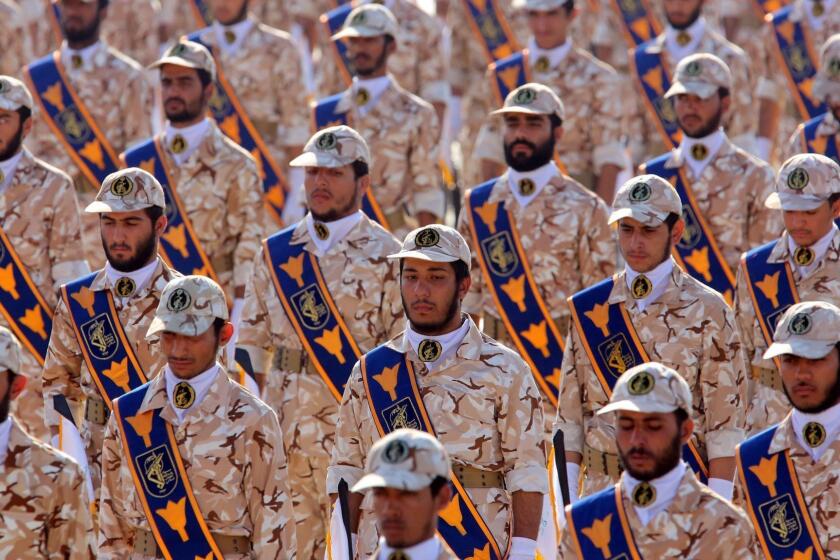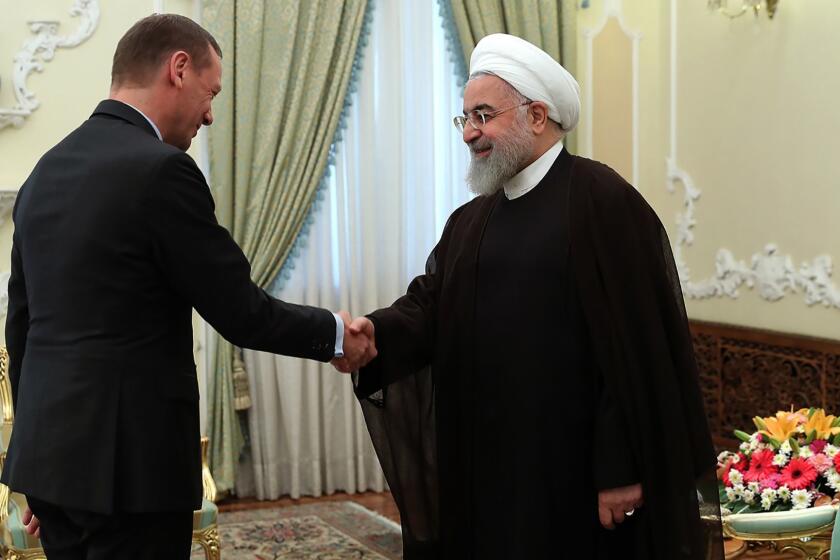Imagine ‘Homeland,’ if all the heroes were Iranian. That’s ‘Gando,’ must-see TV in Iran
- Share via
TEHRAN — There’s something foul infiltrating Iran. To weed it out, elite operatives hunt in the shadows, deploying drones, social-media and old-fashioned gumshoe tactics in a quest to thwart spies and traitors.
These warriors are neither James Bond nor Jason Bourne, but Iran’s Revolutionary Guard Corps, the elite special forces unit that is regarded as a terrorist organization in the West. And now, they have their own TV show: “Gando,” a sort of mirror image of “Homeland.”
Since it began airing in June, “Gando,” which claims to be based on true events, has been must-see TV for more than half of Iran’s 82 million people as well as around 10 million viewers online, says Javad Afshar, the series’ director.
But it’s also become the clearest articulation of an increasingly dominant argument amid the saber-rattling between Tehran and Washington: that those in Iran who advocate for political engagement with the West, including the architects of the 2015 nuclear accord, are, at best, weak-willed and, at worst, traitorous and corrupt. It’s the hard-liners who have the good of the nation at heart.
It’s a perspective hammered time and again throughout the show, which was produced by Martyrs Avini, a cultural center, and appears to have been made under the auspices of the Revolutionary Guard and other military organizations. It airs on the state-owned Islamic Republic of Iran Broadcasting Channel 3 as well as online platforms, including YouTube.
Explaining why the show had resonated with audiences, Afshar, the director, said “Gando’s” success demonstrated the “Iranian people are ready to face anyone willing to betray the country and its sovereignty.”
“Our country is threatened by fifth columnists. Now we need to show … that our security and intelligence services are fully informed of all intrigues and conspiracies,” he added.
The show’s appeal also goes beyond the ideological. It’s well-made, boasting high production values, choreographed gunfights and action sequences that far outclass its peers. It was shot on location in Turkey and China (the show had the budget to hire Turkish and Chinese actors as well); its cast includes venerable actors such as the 71-year-old Dariush Farhang, Iran’s Omar Sharif.
“I don’t usually watch local TV, but I caught it one time on Channel 3 and I couldn’t resist watching for half an hour,” said Farsheed Farivar, a 52-year-old former publisher, in an interview in Tehran. He watched a few episodes more and liked the show.
“Many of my friends said ‘Gando’ is a must,” he said. “Regardless if you’re with the conservatives and hard-liners or pro-reformers, whether you’re Iranian or not, if you can follow the plot it’s worth watching.”
Iran’s Islamic Revolutionary Guard Corps is one of the country’s wealthiest organizations and holds immense political, military and economic power.
Even the show’s lack of verisimilitude, said Ahmad Reza Abdolwand, 27, a plumber who had served in the military, didn’t prevent him from watching the show; it had become a favorite topic of conversation among his family and friends.
“In any case, I enjoyed it regardless of the script or the director or the IRIB’s point of view,” said Abdolwand. “I don’t care about ideology and propaganda.”
True to their namesake — the gando is a small but agile crocodile indigenous to southeastern Iran, renowned for its patience, tenacity and cunning in hunting its prey — the show’s operatives meticulously stalk Iran’s foes, foreign and most certainly domestic. They are disciplined, resourceful and omnipresent.
The Revolutionary Guard’s intelligence department is headed by Mohammad (the good guys are known only by their first names), a stoic polyglot who is aided by his capable and religiously conservative female assistant Amini, dressed in a chador. Other characters, such as the obligatory bespectacled computer whiz furiously typing before a bank of screens or the laconic older operative, also make an appearance.
The list of their foes is long (“There are so many involved, if I tell you their names, you’ll be shocked,” says Mohammad in the series’ pilot) and reflects the dim view that the show’s producers have of Iran’s political and business elite.

Enemies include a long-haired business tycoon, a journalism professor, an environmentalist, a spy masquerading as a British tourist, several money-grubbing — and morally loose — women taking a page from Lady Macbeth to engineer their rise, not to mention a panoply of out-of-touch officials and their pampered relatives.
Reinforcing the show’s plucked-from-the-headlines vibe, the first season’s super-villain is Michael Hashemian, a smarmy stand-in for Jason Rezaian, the Iranian American Washington Post reporter imprisoned for 544 days on accusations of espionage before being released in a prisoner swap in January 2016. Rezaian denies all charges and is suing the Iranian government.
As Iran presses on with its gradual dismantling of terms set by the 2015 nuclear deal, and while tensions with the U.S. increase ever higher, European signatories say a new financial mechanism can salvage the accord.
In the show, Hashemian is described as a top CIA spy who is eventually caught and bartered for cash.
Another target for opprobrium is the government of Iranian President Hassan Rouhani, and especially members of his Foreign Ministry, who are portrayed as bumbling sellouts ready to negotiate Iran’s rights away.
Mohammad, acting as an exemplar of the hard-liners’ world view, says that whether it’s the United States, European nations or neighboring countries, all are after Iran’s sovereignty.
Compromises on nuclear weapons are futile, he adds, because the U.S. aims to topple the state through sanctions and push the starving masses to civil disobedience, and would only seek more excuses to keep the sanctions.
One villain, Sima Azizi, is thought to be modeled after Esmail Samavi, a public relations manager in Rouhani’s office as well as his nephew. In 2015, hard-liners accused Samavi of espionage and giving Rezaian access to sensitive material.
The portrayal appears to have been too much for Rouhani. The government, said film critic Sepideh Abazari, quietly intervened to introduce the character as a “nephew to one of the authorities” rather than specifically mentioning the president.
Last week, the government shot back in more public ways in what is brewing into a verbal duel with the show’s makers.
Mahmoud Vaezi, Rouhani’s chief of staff, protested “Gando’s” “bad treatment” of the Foreign Ministry, accusing the show of being full of lies and slander.
“Over ‘Gando’s’ 30 episodes, some of the country’s top officials are portrayed as malleable while encouraging others to submit to the West,” said Vaezi according to a report from the state-run Islamic Republic News Agency.
Officials, he added, “reserve the right to file lawsuits.”
On Wednesday, the Fars news agency, which is considered close to the Revolutionary Guard, reported that Rouhani’s Cabinet secretary had sent a letter to the head of the government’s planning and budget agency saying that the president had asked for a review of the state TV budget. The news agency portrayed this as a further sign of disapproval of “Gando.”
Iranian Foreign Ministry spokesman Abbas Mousavi dismissed the show in a news conference last week as “not firmly based on reality,” adding that the series’ producers should have asked to see documents relating to Rezaian’s case to “make it seem more realistic.”
Nevertheless, he said, he watched the show. (Foreign Minister Mohammad Javad Zarif, who also has an unflattering appearance in “Gando,” refused to comment on his portrayal, according to a report from the Islamic Republic News Agency, saying he didn’t have time to watch TV.)
“Gando’s” makers, however, have no intention of backing down.
“We’re only supplying what Iranian society has demanded. ‘Gando’ has many more seasons to come,” Afshar said.
Mojtaba Amini, the show’s producer, insisted last week that work would soon begin on a sequel, and that “certain persons should make adjustments in their functional roles to avoid being the subject of ‘Gando.’”
On Tuesday, Amini published an open letter directly responding to Vaezi’s comments last week.
“The series showed the world the reality and power of the Islamic Republic,” Amini wrote, according to a report from an English-language newspaper, the Tehran Times.
“And for those who may not know, the truth is bitter and may cause some people to complain about it.”
Special correspondent Mostaghim reported from Tehran and Times staff writer Bulos from Beirut.
More to Read
Sign up for Essential California
The most important California stories and recommendations in your inbox every morning.
You may occasionally receive promotional content from the Los Angeles Times.













